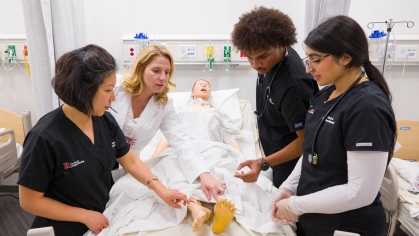New Endowed Rutgers Professorship Honors History Professor’s Legacy

Margaret Marsh, a University Professor of History at Rutgers, and Howard Gillette, a professor emeritus of history at Rutgers–Camden, are making a $500,000 gift to establish the Gerald Grob Endowed Legacy Professorship.
When Margaret Marsh was earning her Ph.D. in U.S. history at Rutgers University–New Brunswick, Gerald Grob filled the role of “my most important mentor,” Marsh says.

Grob, the Henry E. Sigerist Emeritus Professor of the History of Medicine and a founding member of the Institute for Health, Health Care Policy and Aging Research, was “widely acknowledged as the twentieth century’s most eminent and productive historian of mental illness and the treatment of the mentally ill in the United States,” Marsh says.
A member of the National Academy of Medicine, Grob authored 10 books, including The Deadly Truth: A History of Disease in America. He was the inaugural recipient of the Daniel Gorenstein Memorial Award, one of Rutgers' most prestigious faculty honors. Grob, who taught at Rutgers for more than 30 years, died in 2015 at the age of 84.
Marsh, a University Professor who earned her undergraduate degree from Rutgers University–Camden, joined Rutgers in 1998 as dean of the Faculty of Arts and Sciences–Camden. She has served twice as chancellor, on an interim basis. As a faculty member, she divides her time between Rutgers–Camden and the Institute for Health. She remembers how Grob, who remained a mentor and a friend until the end of his life, encouraged her to return to Rutgers–Camden as dean.
“In many ways, I owe the success of my academic career to Gerry,” Marsh says. “He was a great mentor, not just to me but to all of his students, and I have tried to follow his example.”
She and her husband, Howard Gillette, a professor emeritus who taught at Rutgers–Camden from 1999 to 2012, are giving $500,000 to endow the new professorship in the Faculty of Arts and Sciences–Camden. Faculty in the role can be from the fields of history or sociology of medicine/health, health psychology, health policy, or a similar field.
“I am deeply appreciative of Dr. Marsh and Dr. Gillette for their generosity and vision in bestowing this remarkable gift,” says Rutgers–Camden Chancellor Antonio D. Tillis. “This professorship will greatly benefit our students and expand the high level of research that is ongoing on our campus.”
The professorship, which has been approved by the Board of Governors, will have a dual appointment to the Institute for Health, Health Care Policy and Aging Research. “Dr. Grob, as a founding member, and Dr. Marsh, as a longtime core faculty member, have contributed greatly to the work of the Institute for Health,” says Tobias Gerhard, director of the Institute and professor of pharmacy and epidemiology at Rutgers. “We are thrilled that this professorship will carry their legacy of health research, teaching, and mentoring far into the future.”
Among her many leadership achievements, Marsh launched the nation’s first Ph.D. program in childhood studies at Rutgers–Camden and initiated Ph.D. programs in computational and integrative biology and public affairs/community development. She is an expert in the history of infertility, reproductive medicine, and reproductive technology and has written three books on these subjects in collaboration with her sister, Wanda Ronner, who also earned her B.A. from Rutgers–Camden and is a professor of clinical obstetrics and gynecology at the Perelman School of Medicine of the University of Pennsylvania. Marsh is an elected Fellow of the American Association for the Advancement of Science (AAAS) and was inducted into the Rutgers Hall of Distinguished Alumni in 2010.
Gillette founded and served as director of the Mid-Atlantic Regional Center for the Humanities and is co-editor of the online Encyclopedia of Greater Philadelphia, which is hosted at Rutgers–Camden. His latest book, The Paradox of Urban Revitalization: Progress and Poverty in America’s Post-industrial Age, was published by the University of Pennsylvania Press in March 2022. His 2005 book, Camden After the Fall: Decline and Renewal in a Post-Industrial City, which also was published by the University of Pennsylvania Press, received best book awards from the Urban History Association and the New Jersey Historical Commission.
Marsh and Gillette are grateful that Rutgers has created the opportunity for faculty to be able to endow such legacy professorships, which has made it possible for them make this gift honoring Marsh’s mentor and supporting research at Rutgers–Camden and the Institute of Health.
“We believe that investing in public higher education is the best way to support the young people who are going to carry the burden in future years,” Gillette says. “This gift will carry forward and benefit both scholarship and generations of Rutgers students in Camden and New Brunswick.”


